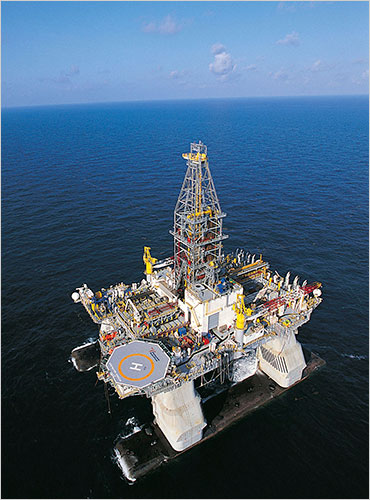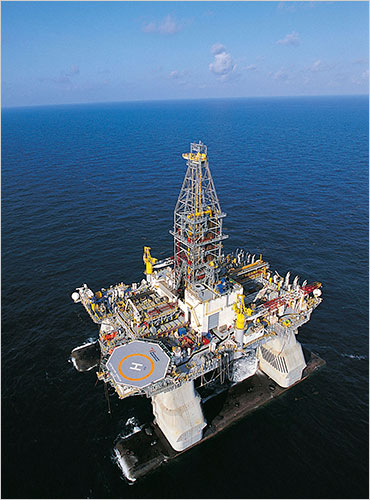 The Deepwater Horizon rig, pre-explosion and pre-tipping.Photo: TransoceanBig Banking, Big Auto, and Big Coal have all been to the woodshed in the last little while. Tomorrow it’s Big Oil’s turn. Capitol Hill Summer Theater kicks off in style when the top execs of the world’s five largest oil companies report for their very own congressional beatdown. Leading the drilling grilling will be Rep. Ed Markey (D-Mass); Big Oil’s biggest headache has already accused BP of either lying or incompetence on national TV.
The Deepwater Horizon rig, pre-explosion and pre-tipping.Photo: TransoceanBig Banking, Big Auto, and Big Coal have all been to the woodshed in the last little while. Tomorrow it’s Big Oil’s turn. Capitol Hill Summer Theater kicks off in style when the top execs of the world’s five largest oil companies report for their very own congressional beatdown. Leading the drilling grilling will be Rep. Ed Markey (D-Mass); Big Oil’s biggest headache has already accused BP of either lying or incompetence on national TV.
While Markey and company meet Big Oil in Washington, Barack Obama returns to the Gulf for his first overnight visit, and uses his first ever Oval Office address to outline a plan for making BP compensate Gulf businesses and residents for their mounting, spill-related losses.
Pundits say tomorrow’s congressional oil hearing could match the drama of the 2008 performance by those crazy auto CEOs who flew to Washington on their private jets to ask for a public bailout. Oops. Some are predicting a reprise of the 1994 cigarette spectacle when tobacco company execs testified under oath that nicotine is not addictive.
We should be so lucky. Chances are what we’ll get from the Top Dogs of Exxon Mobil, Chevron, Shell, and Conoco Phillips is four carefully-parsed versions of “We’re not BP.” (BP chief Lamar McKay would love to do the same, but that would just be too big a whopper.)
We’re way more safer: One message we’re sure to hear is that the Gulf spill was preventable, if only BP had paid as much attention to safety as the other four oil execs will claim their companies do. But let’s get real: Lise Olsen and Eric Nalder in the Houston Chronicle discuss the hundreds of accidents that have occurred on Gulf of Mexico drilling rigs over the past five years, and how little oil companies were penalized.
It was rare for any oil company to pay penalties for problems found in accidents investigated by the MMS, records show. The agency can charge $35,000 per day per violation. But many proposed violations get reduced or dropped during behind-the-scenes reviews. Records show that most final payments were small and took a year or more to collect.
That damn black gold: It’s also likely that the Big Oil Five will be asked about how all that research into biofuels and alternative energy is going. They’ll trot out numbers and talk about potential, but the bottom line is that like the rest of us, they just can’t quit oil. Here’s a reality check from Deborah Gordon and Daniel Sperling, writing in the Washington Post.
And so oil companies are, quite rationally, investing the equivalent of pennies in biofuels and other alternative energies, compared with dollars in unconventional oil prospects. But while they are behaving logically in economic terms, they aren’t serving the public interest. Drilling in uncharted territory is dangerous, as we have seen, and unconventional oil extraction carries the potential for any number of environmental disasters. The current situation in the gulf, where BP was tapping hot, high-pressure oil almost 3 1/2 miles below the ocean floor, is only a prologue to the saga of how complex and costly our oil habit will become, if left unchecked.
For the past six weeks, it’s been all BP, all the time. As the competition prepares to take a turn in the spotlight, here’s a little preview of what they’ve been up to — in the spirit of fairness.
Let it flow: Chevron got back into the spill business this weekend when an underground pipe near Salt Lake City broke Friday night, sending an estimated 21,000 gallons of oil into a nearby creek and coating almost 300 birds in oil. At the beginning of May, a ruptured ExxonMobil pipeline in Nigeria spilled more than a million gallons of oil into the Niger Delta. Residents say the use of dispersants to break up the spill is making people sick.
Tales from the dark side: Environmentalists are so exercised about the behavior of Chevron around the world-including its fight against an oil damage lawsuit in Ecuador — that they’ve published an alternative annual report, titled “The True Cost of Chevron” [PDF].
Money, money, money: And what would a roundup of Big Oil exploits be without profit figures. Here’s what the Big Five made during the 1st quarter of 2010. Drum roll, please … ExxonMobil: $6.3 billion; BP: $6 billion; Shell: $4.9 billion; Chevron: $4.5 billion; Conoco Phillips: $2 billion.
The sweet smell of excess.




